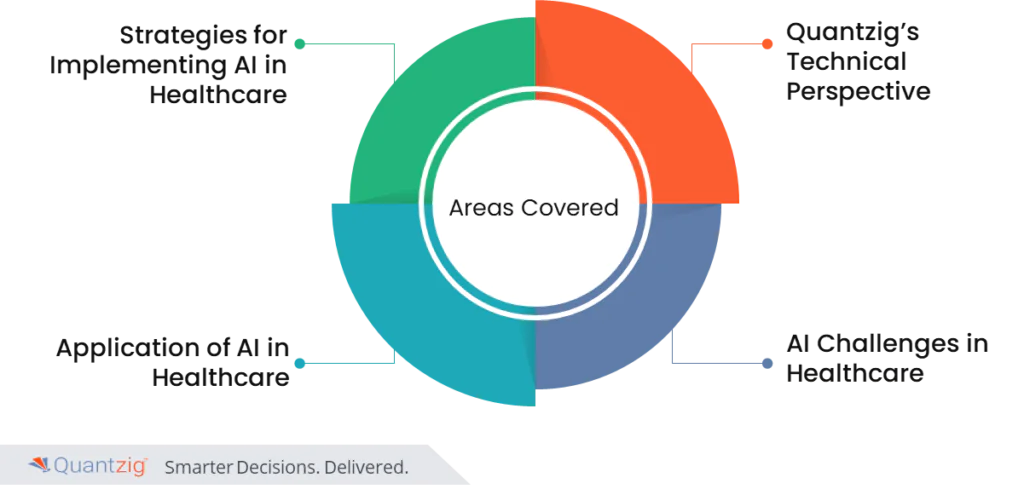The integration of AI in healthcare, a sector projected to reach a staggering $188 billion by 2030, presents multifaceted challenges that require meticulous attention. One of the primary challenges is ensuring the accuracy and reliability of AI algorithms, particularly in critical areas like diagnostic assessment and treatment of rare diseases. Misdiagnoses due to human error in healthcare settings can have grave consequences, which is why Quantzig emphasizes the importance of robust data validation and algorithmic transparency.
Furthermore, ethical considerations and privacy concerns are paramount, especially when dealing with sensitive patient data such as Electronic Health Records (EHRs), CT scans, and magnetic resonance images. AI implementations in healthcare must navigate through the complexities of compliance with stringent regulations like GDPR and HIPAA. This involves addressing concerns related to data breaches, privacy of Personally Identifiable Information (PII), and healthcare data breaches, which have been increasingly prevalent.
Quantzig’s approach to tackling these AI challenges involves a blend of technical acumen and ethical governance. By focusing on AI technologies like deep learning and neural networks and ensuring adherence to regulations, Quantzig aims to harness AI’s capacity for predictive analytics, targeted treatment, and personalized care plans, all within a stringent ethical framework that prioritizes patient privacy and data security.

Table of Contents
Strategies for Implementing AI in Healthcare
Successfully integrating AI into the healthcare sector, which is rapidly advancing towards a market worth of $188 billion by 2030, requires strategic foresight and collaboration. Bridging the gap between AI technologists and healthcare professionals is vital to create solutions that are not only technically robust but also resonate with clinical significance. Key to this process is understanding the objectives of AI in healthcare, such as increasing the effectiveness of diagnostic processes, ensuring safer surgeries, and facilitating easy information sharing.
1. Collaborative Environment Development:
Fostering a collaborative environment is crucial, where solutions developed are not only grounded in advanced AI technologies like deep learning and neural networks but are also attuned to the practical realities of healthcare delivery. This involves addressing challenges such as human error in healthcare settings, privacy concerns, data leakages, and compliance with regulations like GDPR and HIPAA.
2. Adapting to the Dynamic Nature of Healthcare:
The dynamic and ever-evolving nature of healthcare requires AI systems capable of continuous learning and adaptation. This means not only applying AI to diagnostic assessment and treatment but also optimizing operational aspects like hospital management and resource allocation.
3. Proactive AI Implementation:
Quantzig advocates for a proactive approach in AI implementation. This involves anticipating the changing needs of healthcare, from the treatment of rare diseases to the development of targeted treatments and drug discovery. By staying ahead of these changes, AI tools can be designed to remain effective, relevant, and capable of improving patient outcomes.
By adopting these strategic approaches, AI can profoundly streamline clinical workflows, enhance diagnostic accuracy, and ultimately lead to improved patient care and operational efficiency in healthcare.
Application of AI in Healthcare

The applications of AI in healthcare are vast, spanning from personalized patient care to operational improvements. As the global AI in healthcare market heads towards an estimated value of $188 billion by 2030, the scope for AI-driven innovation widens.
1. Patient Care and Predictive Analytics:
In patient care, AI’s role is transformative, particularly through its predictive analytics capabilities. Early disease detection, a crucial objective of AI in healthcare, benefits greatly from these advancements, allowing for more effective and timely interventions. Personalized treatment plans, another key application of AI, cater to individual patient needs, significantly enhancing the quality of care. This approach is in line with AI’s goals of reducing overall healthcare costs and improving diagnostic processes.
2. Operational Efficiency and Resource Optimization:
On the operational side, AI-driven analytics play a pivotal role in hospital management. Applications range from optimizing resource allocation to reducing costs and improving service delivery. AI’s ability to process and analyze vast amounts of data, including Electronic Health Records (EHRs), radiography, CT scans, and magnetic resonance images, is crucial in achieving these operational efficiencies.
Perhaps one of AI’s most significant potentials is in democratizing healthcare. By making high-quality care accessible, AI can bridge gaps in healthcare disparities, particularly in underprivileged areas. This aligns with AI’s broader goal of enhancing the effectiveness of healthcare delivery globally.
3. Bridging Healthcare Disparities:
Quantzig’s analytics solutions, employing technologies like deep learning and neural networks, are at the forefront of these applications. Their expertise is not just in crafting AI solutions but also in integrating them seamlessly into the existing healthcare landscape, driving innovation and operational excellence.

Quantzig’s Technical Perspective on Overcoming AI Challenges in Healthcare
Quantzig’s approach to tackling AI challenges in healthcare hinges on leveraging advanced analytics and cutting-edge machine learning models like deep learning and neural networks. These technical solutions are crucial for integrating AI seamlessly into healthcare frameworks, thus amplifying capabilities without disrupting core operations.
1. Integration of Sophisticated AI Technologies:
By employing sophisticated AI technologies such as deep learning and neural networks, Quantzig’s solutions are tailored to address specific challenges in healthcare. These include the accurate assessment of diagnostics, personalized patient care, and the optimization of hospital management operations.
2. Overcoming Data and Compliance Challenges:
A key aspect of Quantzig’s technical perspective is navigating the complex data landscape in healthcare. This includes managing electronic health records, radiography, CT scans, and magnetic resonance images, ensuring data integrity, and addressing privacy concerns in line with GDPR and HIPAA regulations. Overcoming these challenges is vital for the successful application of AI in diagnostic assessment, virtual health assistants, and targeted treatment.
3. Ensuring Ethical and Transparent AI Applications:
Ethical governance in AI applications is a cornerstone of Quantzig’s approach. This involves ensuring the ethical use of AI in handling sensitive patient data, addressing privacy concerns, and maintaining transparency in AI-driven decisions. By focusing on these areas, Quantzig aims to create AI solutions that are not only technically proficient but also ethically sound and regulatory compliant.
Quantzig’s commitment to technical excellence and innovation positions them as a leader in driving the integration of AI in healthcare. Their approach underlines the importance of a symbiotic relationship between AI tools and healthcare professionals, ensuring mutual enhancement and the elevation of patient care quality.

Conclusion: Embracing AI’s Potential in Healthcare with Quantzig
The journey of integrating Artificial Intelligence (AI) within the healthcare sector, with its projected market value of $188 billion by 2030, is fraught with complex challenges but also abundant with groundbreaking opportunities. Quantzig’s deep-rooted understanding of both AI technology and healthcare intricacies uniquely positions them to offer impactful solutions that adeptly navigate these challenges. As AI’s role in healthcare continues to expand, it heralds a future where healthcare delivery is not only more efficient and precise but also increasingly empathetic and patient-centric.
The promise held by AI and machine learning technologies, from improving diagnostics to advancing drug discovery and streamlining workflows, is immense. By enhancing the human elements of healthcare through AI voice assistants and AI- and ML-based systems, a new era of healthcare is on the horizon — one characterized by advanced diagnostics, early symptom predictions, and more personalized patient care. Quantzig is at the forefront of this transformation, committed to realizing a vision where AI not only enhances operational efficiency but also enriches the patient experience.
In the face of challenges such as data quality, interoperability, security, and infrastructure limitations, Quantzig’s innovative solutions pave the way for overcoming these obstacles. Their technical expertise and ethical approach in AI implementation ensure that the healthcare sector can harness AI’s full potential responsibly and effectively. As we move forward, the role of AI in healthcare is set to grow exponentially, promising a future where healthcare is not just a science but also an art enhanced by intelligent technology.
FAQs: AI Challenges and Solutions in Healthcare
1. What are the main challenges of implementing AI in healthcare?
The key challenges include ensuring the accuracy and reliability of AI algorithms, addressing data quality issues, managing privacy and compliance with regulations like GDPR and HIPAA, and overcoming interoperability barriers. Additionally, concerns about human error in healthcare settings, ethical considerations, and infrastructure limitations play significant roles.
2. How is AI expected to impact the healthcare market?
The global AI in healthcare market is projected to reach approximately $188 billion by 2030. AI is anticipated to transform healthcare by improving diagnostic processes, reducing costs, facilitating safer surgeries, and enabling more efficient information sharing.
3. What are some key applications of AI in healthcare?
AI applications in healthcare include diagnostic assessments, virtual health assistants, personalized treatment plans, drug discovery, and optimizing hospital management. AI also plays a crucial role in early disease detection and in creating personalized care plans.
4. How does Quantzig approach AI challenges in healthcare?
Quantzig addresses AI challenges in healthcare by emphasizing robust data validation, algorithmic transparency, ethical governance, and compliance with regulations. They focus on integrating AI technologies like deep learning and neural networks into healthcare frameworks, ensuring a balance between technical proficiency and ethical considerations.
5. What are the objectives of AI in healthcare according to Quantzig?
Quantzig views the objectives of AI in healthcare as increasing the effectiveness and accuracy of diagnostic processes, reducing overall healthcare costs, facilitating safer surgeries, and enabling seamless information sharing, all while ensuring patient privacy and data security.
6. How can AI contribute to reducing healthcare disparities?
AI has the potential to democratize healthcare by making high-quality care accessible in underprivileged areas, thereby bridging gaps in healthcare disparities. This involves using AI for predictive analytics, resource allocation, and improving service delivery across diverse populations.
7. What are the future prospects of AI in healthcare?
The future of AI in healthcare looks promising with widespread deployment expected. Challenges like data discrepancies and research flaws need to be addressed, but the advancements in healthcare diagnostics, early symptom prediction, drug discovery, and AI-based systems are set to revolutionize patient care and operational efficiency.


